MercoPress. South Atlantic News Agency
Tag: China
-
Friday, May 8th 2015 - 10:54 UTC
China superpower? It relies on imports for energy, iron and...water (for food)

Among the mountain of statistics produced by China every year, there is one impossible to ignore: according to the Ministry of Land and Resources 61.5% of China's ground water is too dangerous even to touch, which means that along with being unsuitable for agriculture or drinking this water is unfit for any human contact.
-
Tuesday, May 5th 2015 - 17:50 UTC
China warms up to Taiwan and calls for future relations on an “equal basis”
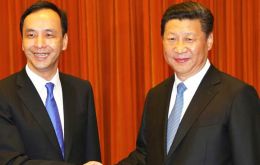
Chinese President Xi Jinping met with the chairman of Taiwan's ruling Nationalist Party (KMT) in Beijing on Monday for the highest-level meeting between the two sides since 2009.
-
Thursday, April 30th 2015 - 07:29 UTC
Beware: China announces plan to seven-fold increase Antarctic krill catches

Conservation groups and scientists worry that China’s push to boost its harvest of krill -- a shrimp-like creature used for aquaculture feed and human supplements -- may leave Antarctica’s whales, seals and penguins struggling to survive. China’s leaders say they want a seven-fold increase in krill production, according to a recent report in the state-owned China Daily newspaper.
-
Wednesday, April 29th 2015 - 09:22 UTC
Argentine central bank increases reserves to highest level since November 2013

Argentina's central bank bought 630 million of dollars on the local currency market on Tuesday in one of its largest-ever purchases, a move that will bolster the country's precariously low hard currency reserves. Some 500 million of the dollars purchased were proceeds from last week's 1.5 billion auction of bonds by state energy company YPF.
-
Wednesday, April 22nd 2015 - 06:35 UTC
Petrobras receives financial support from China and local banks
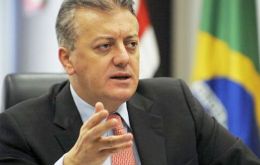
Brazilian state-run oil company Petrobras approved a series of financial agreements with local and international banks that will meet its financing needs in 2015, the company announced. In a filing with local stock regulators, Petrobras said that the deals will provide the company with access to about 6.2 billion dollars, including a 3.5bn financing contract reached with China Development Bank on April 1.
-
Monday, April 20th 2015 - 06:31 UTC
IMF warns “lower growth” becoming a relevant challenge over the medium term

The International Monetary Fund warned in a communiqué that while economic growth in developed countries had strengthened, some emerging nations were being hit by weaker commodity prices and exports.
-
Monday, April 20th 2015 - 06:24 UTC
China cuts banks' reserve ratio to bolster lending and a weak economy
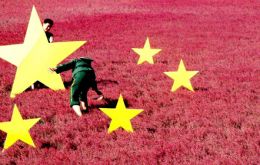
China's central bank is to cut its bank reserve requirement ratio by one percentage point. The People's Bank of China said that the new reserve requirement would take effect from Monday. The aim is to stimulate more lending into the nation's slowing economy.
-
Thursday, April 16th 2015 - 08:12 UTC
Brazil questions Argentina's approach to China in military procurement
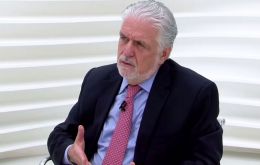
Brazil's minister of defense Jacques Wagner questioned Argentina's approach to China regarding military procurement, but discarded any conflict with Buenos Aires, since the country is a 'strategic and important partner' of Brazil. Apparently the issue was brought up by Jacques when he visited his counterpart Agustín Rossi in Buenos Aires last week.
-
Tuesday, April 14th 2015 - 18:35 UTC
China's exports/imports fall in March; trade surplus lowest in 13 years
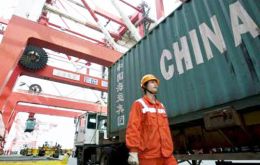
China's monthly trade data shows exports fell in March from a year ago by 14.6% in Yuan terms, compared to expectations for a rise of more than 8%. Imports meanwhile fell 12.3% in Yuan terms compared to forecasts for a fall of more than 11%.
-
Tuesday, March 31st 2015 - 10:13 UTC
Brazil ready to join China's Asian Investment bank; (Argentina any moment)

The Asian Infrastructure Investment Bank, AIIB, seen as a challenge to existing institutions the World Bank and Asian Development Bank, has drawn a cool response from the United States, despite which European U.S. allies including Britain, France, Germany and Italy have already announced they would join the bank.
